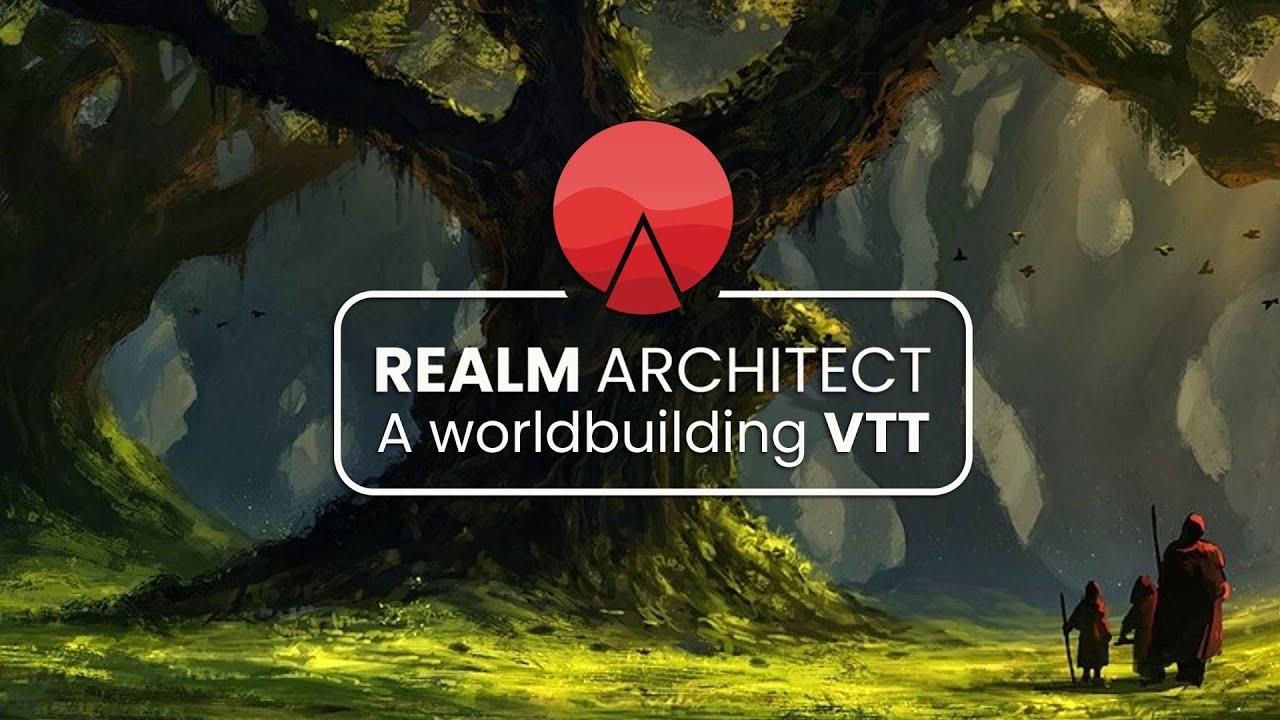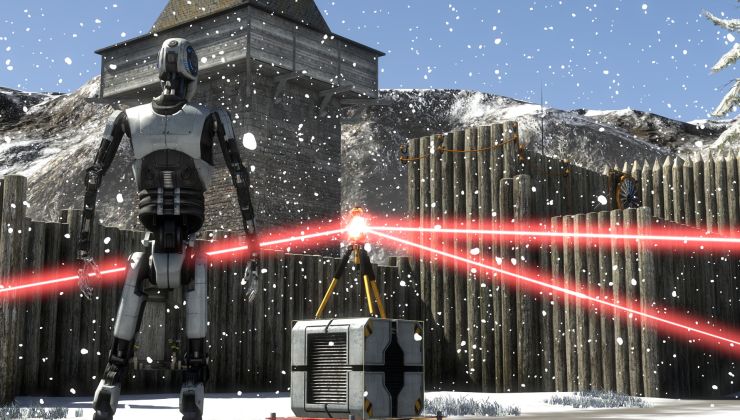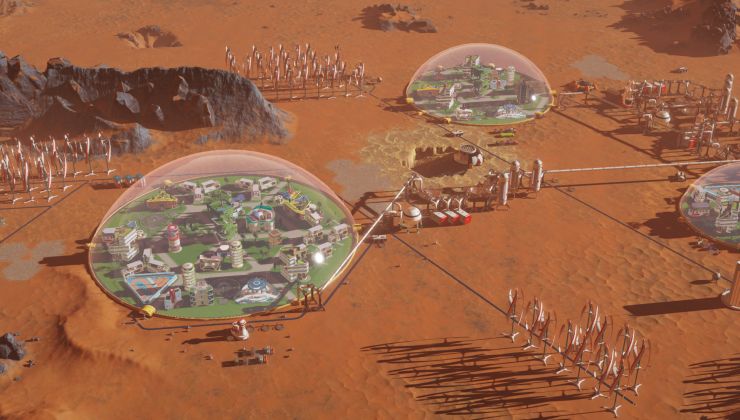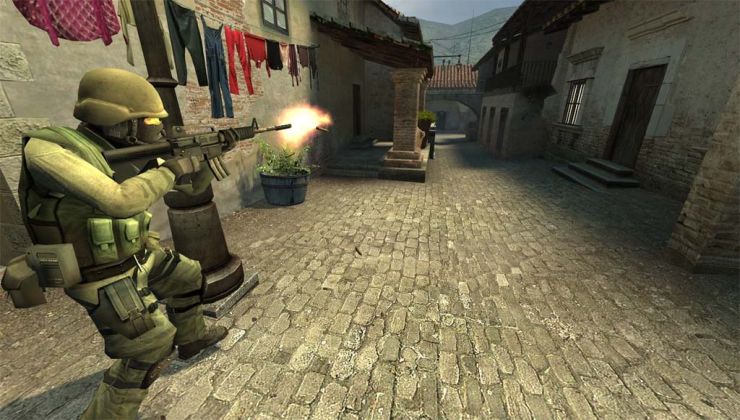Realm Architect is an attempt to make a next-gen virtual tabletop experience, while also keeping it simpler to get into and keep running. It also looks great and it's confirmed to get Linux support now too.
They say that it "completely changes the way you create and play TTRPG campaigns, makes it easier than ever before to set up entire worlds, or Realms as they are called here, and removes the time-consuming stress of preparing everything down to the most minor of details".
It's currently crowdfunding on Kickstarter, with the initial €22,000 goal smashed very quickly and it's now sitting around €86,000. Thanks to the current funding level, we now have Linux support fully confirmed.

Direct Link
Features:
- Drag & Drop: The ease of use in Realm Architect is next to none, with zero coding required. Every essential element is right there for you to drag & drop onto your map.
- Easy to use codex: Whether you want to upload your own character sheets and monster manuals or use existing ones, it's as easy as the click of a button.
- No notes required: Our automated systems keep track of player HP, status effects, and even buffs & boons that affect your die-rolls. No need to write anything down, we do all the grunt work for you!
- Build Realms, not maps: You can navigate from the world map, to a town center, and waltz into the inn with a few clicks, no need to load separate scenes.
- Plug & Play: Realm Architect will have ready-made content for you to adventure through. Choose from campaigns made by experienced GMs and veteran publishers and find whatever your thrill-seeking heart may require.
- Make it your own: the UI will be customizable so the look & feel of the interface matches your campaign. Going for a Lovecraftian horror setting or a cyberpunk sci-fi thriller? Everything is possible.
So why yet another one? It all comes down to time and easy of use it seems. They think they can do better than the likes of Foundry VTT, Roll20 and others.
Check it out on Kickstarter.
Side note, their organization seems very dedicated to the physical--information is all attached to a place or maybe a person. A lot of the information about my campaigns is about cultural institutions or history or stuff, it's not really geographical in nature, and I don't want to organize it into snippets attached to places.
Second is, they talk about putting in systems other than D&D, but it's hard to be sure how well that's likely to work. From the way they talk the rest of the time it seems quite D&D-centric.
Spoiler, click me
TL;DR I don't want to play D&D, I want to play GURPS or Hero System or stuff like that, and even GURPS my group has decided we prefer 3rd Edition to 4th overall (although we import one or two little 4th edition features), and I'm not confident this thing will actually and practically let me do that.
Last edited by Purple Library Guy on 17 May 2023 at 4:48 pm UTC
TL;DR I don't want to play D&D, I want to play GURPS or Hero System or stuff like that, and even GURPS my group has decided we prefer 3rd Edition to 4th overall (although we import one or two little 4th edition features), and I'm not confident this thing will actually and practically let me do that.From my understanding GURPS players have pretty much latched onto FoundryVTT, it's the only one that has any sort of 'officially unofficial' support for the system. Thought admittedly it is 4th edition, and not 3rd. We switched to 4th edition for the game we were playing pre-COVID, but there are definitely things I like about it more than 3rd, and things that I don't (like the dropping of PD, and assuming everyone basically just has a +3 to active defenses... like you're still doing the math there...)
The things they definitely fixed that were/are broken in 3rd edition are the languages / literacy. Things they broke though are the indexing / book layout. I maintain 3rd edition has far better layout, and it's much easier to find rules.
We switched to 4th edition for the game we were playing pre-COVID, but there are definitely things I like about it more than 3rd, and things that I don't (like the dropping of PD, and assuming everyone basically just has a +3 to active defenses... like you're still doing the math there...)I definitely have mixed feelings about 4th. I agree with you about PD. I like that ST and HT are cheaper than DX and IQ because almost all the skills are based on DX and IQ. It's much easier to build a brawn-based character in 4th edition; in 3rd it's quite hard unless your character is from a naturally strong race. I don't like the simplification of having all the skills max at 4/level instead of mental skills being cheaper. The fact is that a decent mental-oriented character tends to need way more skills than a physical-oriented one, whether it's a wizard or a psionic or just a scholar or engineer or mad scientist. So with 4/level for both physical and mental, suddenly you got physical combat types can push their key skills through the roof while mental oriented characters are half-assed. I like a couple of the combat options in 4th, like the "deceptive attack" where you take a -2 to hit for every -1 to the opponent's defence; we've totally backported that into our 3rd edition games. I kind of like the bonus for defined skill groups thing.
Last edited by Purple Library Guy on 17 May 2023 at 10:38 pm UTC
These tools seem really interesting to me, but also seem very overwhelming. Like the amount of "pre-work" and setup and learning just scares me off of trying.
I really liked a little German system called ERPS (classless, with some houserules) and Savage Worlds. I found that I prefer mostly classless systems. But a few years ago my longtime group broke up, family, work, ... and I currently don't have the time/energy to start again.
Anyway, I guess, in case I start playing again, it will be online, so I am generally interested in stuff like this. And if there are more competing tools, that's fantastic. More options and more ideas and approaches. So, I hope, this will work out.
I am currently not playing at all, but I started with AD&D, went to 3.5 then and disliked 4th Edition immensely. In the mean time I played MERS,Rolemaster, Vampires, Deadlands and Hell on Earth, Shadowrun, ...The thing that amuses me lately is people standing behind Alignment. They mostly dropped it in Pathfinder 2e (with it only really being required by divine characters, which makes sense with the lore, and trying to get a deity to give you special powers.) But having played GURPS for a long time, that has no class restrictions, no levels and no alignment, but has advantages and disadvantages and quirks that are a literal 'this is how you play your character, and you get points for following how you created your character' guide, it's just weird to me that people will defend using alignment that tries to put you in a 9 grid box of 'this is how you should act'.
I really liked a little German system called ERPS (classless, with some houserules) and Savage Worlds. I found that I prefer mostly classless systems. But a few years ago my longtime group broke up, family, work, ... and I currently don't have the time/energy to start again.
Anyway, I guess, in case I start playing again, it will be online, so I am generally interested in stuff like this. And if there are more competing tools, that's fantastic. More options and more ideas and approaches. So, I hope, this will work out.
It made sense when it was applied to factions within the universe, but just doesn't work in any other setting. Class restrictions are kind of the same for me. Like why can't you have a wizard who is good with a sword? Gandalf wasn't half bad with a blade, and most fantasy worlds are at least 80% based on Tolkien's writings. Pathfinder 2e is doing a 'remaster' after all of the OGL nonsense that Wizards of the Coast attempted to do, so that'll be interesting, but at least they're ditching Alignment finally.
Maybe we should get some of us together and pick a game to play and try out Linux based VTTs (I need a reason that I spent so much silly money on Fantasy Grounds).
I'm very happy with Foundry VTT, because I can actually mess with it. I can write JavaScript macros that operate on the actual data structures of the entites. I can modify the databases and how it'll behave then is a known quality. I can export thing into JSON, change thing within and then import it again.
And I can host Foundry VTT, multiple instances, on my own little rented server. I don't have to host the GM client on my own home machine.
Yeah, not for me. Looks far too "closed off" and limited to me. Seems to be very keyed to D&D only, everything integrated with no way to mess with any of it.Honestly, I think FoundryVTT picked all the right elements to get people to use it. Server based, 50 dollar flat license, where publishers can either sell their content, or tHe systems are free. And it runs in a browser.
I'm very happy with Foundry VTT, because I can actually mess with it. I can write JavaScript macros that operate on the actual data structures of the entites. I can modify the databases and how it'll behave then is a known quality. I can export thing into JSON, change thing within and then import it again.
And I can host Foundry VTT, multiple instances, on my own little rented server. I don't have to host the GM client on my own home machine.
Edit: side note, this morning I did web benchmarks for some webgl info for FoundryVTT... somehow Edge installed through Flatpak was 100 points higher than Chromium and Konqueror. Firefox was about 280 less than Edge.
Last edited by slaapliedje on 18 May 2023 at 7:08 pm UTC
/saltiness
Even though I play board games with a couple friends on a routine schedule, they will never play a pen & paper RPG again. We did it long ago with a DM that we didn't enjoy, and they're stuck with that memory and won't ever try it again. So, programs like this would be a hopeless, disappointing waste of time and money for me.Sad. But I could see this happening for sure. Sometimes the RPG experience is just a reason for friends to get together. Boards games work as well, but I think the advantage of RPGs is you don't have to learn new rules every time you get together (unless of course you play the same board games over and over.)
/saltiness
These tools seem really interesting to me, but also seem very overwhelming. Like the amount of "pre-work" and setup and learning just scares me off of trying.
It definitely can be. You kind of have to put in the work to get the most out of it IMHO. I have been using FoundryVTT in the past and the best feature was the DnDBeyond importer addon. With that and a search plugin you can hit a shortcut to get a textbox to input something to search. That is a godsent for looking up spells and monster sheets and whatnot on the fly.
I'd argue that being a DM is overwhelming anyways even when playing fully analogue. I would rather put in the effort before the game starts and then have a smoother session as a result.
For instance I had it setup to automate attack rolls. Select a Goblin, mark a player, click on the weapon and it rolls it all. Attack roll, checks the targets AC, handles advantage/disadvantage, damage, checks resistances of the target, hell I even had it setup to play a little sound and animation in case of shooting an arrow :D
Now that I know my way around it, though, it really takes a lot of load off my back.
I'd argue that being a DM is overwhelming anyways even when playing fully analogue
Yes.
You still need to prepare the actual meat of the session and stay nimble to improvise, that doesn't change.
You still need to create maps. Just that instead of a combination of drawing them wet-erase mats, using pre-printed battlemats, various tiles and printing stuff, it's now a combination of using the original maps from various sources (pre-written modules, PDFs of pre-printed battlemats and tiles, patreons), drawing them with Dungeondraft or Dungeon Alchemist.
Tokens are easier now. I don't need to print cardboard ones or paint minis. On the other hand, a lot of my minis now go unused :(
The dice rolling and maths is mostly taken from you. Which simplifies things, but on the other hand, it takes away from the physical dice rolling that you might enjoy.
All in all, I think the actual effort I put in playing digital is about the same as analogue. There's a bit more of a wow-factor with effects you can achieve, but the social aspect it less playing online. Swings and roundabouts.
Quoting: Holzkohlen
I'd argue that being a DM is overwhelming anyways even when playing fully analogue
Yes.
You still need to prepare the actual meat of the session and stay nimble to improvise, that doesn't change.
Agreed!! I think the system can also really play a role there in prep time. My group moved away from maps and minis, which helped out a ton prep wise. I can put a good session together on one page of notebook paper, compared to proper DnD style, which always seemed to take a lot more prep.
Although, to be fair, the end result does look and play a lot different. I always enjoyed the tactical aspect of map based play, but building good tactical encounterd takes a lot of time (and I'm the only one in my group that really enjoys that)
The dice rolling and maths is mostly taken from you. Which simplifies things, but on the other hand, it takes away from the physical dice rolling that you might enjoy.A friend of mine bought this snazzy set of dice where you roll the things and they export the die roll to Roll20 (presumably also to FoundryVTT etc). We were all really impressed and thought it was major cool. Unfortunately, they didn't work worth a damn. He would roll 3d6 and half the time only 2 dice would roll . . . which meant you had to look carefully, because he did get a result. Or they would trigger without him doing anything. They were a pain and he sent them back. Pity, because it seemed like such a nice idea.
As to the maps and stuff . . . I used to break those out for big fights, but not bother and just keep it abstract with small ones. Especially since often the small fights just happened because the players did something interesting and unexpected, not because I had anything planned. When I did break out the maps, often as not I'd just use dice and coins and things to represent opponents. At some instinctive level, on average I'd rather they were listening to my descriptions than looking at the map.
Don't get me wrong, I quite enjoy the tactics of a solid fight, and I do value the tactical information from that spatial representation. I just feel that the bare bones, just sparse lines and an arbitrary representation of combatants, are what give the information, and everything beyond that is just pulling you out of the imagination level by getting you to look at the map.
Last edited by Purple Library Guy on 21 May 2023 at 5:25 pm UTC
With maps, yeah, I now do need way more maps, because my players are accustomed to having maps for everything. And I often do now, except for situations that are totally off the cuff.
Though I realize, I now don't do any in-session live drawing of improvised maps. I either have something prepared or we're doing it completely "theater of the mind". In Foundry, I could probably create a new scene and draw the map with the drawing tools right there, but I never have.
Wait, what? There are physical dice that'll upload to a VTT? If they can get that to work, that'd be pretty sweet! The Projector / FoundryVTT set up I currently have is pretty sweet, and now I've added a conference room style microphone / speaker to the mix, so that if people can't show up locally, then I can still have them join the game via Discord.The dice rolling and maths is mostly taken from you. Which simplifies things, but on the other hand, it takes away from the physical dice rolling that you might enjoy.A friend of mine bought this snazzy set of dice where you roll the things and they export the die roll to Roll20 (presumably also to FoundryVTT etc). We were all really impressed and thought it was major cool. Unfortunately, they didn't work worth a damn. He would roll 3d6 and half the time only 2 dice would roll . . . which meant you had to look carefully, because he did get a result. Or they would trigger without him doing anything. They were a pain and he sent them back. Pity, because it seemed like such a nice idea.
As to the maps and stuff . . . I used to break those out for big fights, but not bother and just keep it abstract with small ones. Especially since often the small fights just happened because the players did something interesting and unexpected, not because I had anything planned. When I did break out the maps, often as not I'd just use dice and coins and things to represent opponents. At some instinctive level, on average I'd rather they were listening to my descriptions than looking at the map.
Don't get me wrong, I quite enjoy the tactics of a solid fight, and I do value the tactical information from that spatial representation. I just feel that the bare bones, just sparse lines and an arbitrary representation of combatants, are what give the information, and everything beyond that is just pulling you out of the imagination level by getting you to look at the map.
This here is the Kickstarter campaign for the Bluetooth dice, that's still in development: https://www.kickstarter.com/projects/pixels-dice/pixels-the-electronic-diceouch, 200 bucks per set... granted doesn't look like you can get in on them now.
I'll have to check 'em out, but it might be cheaper just to get some android apps. Granted rolling real dice is fun...
We used to learn a new game every time because one of my friends has a very large collection that continues to grow. Not too long ago, we switched to sticking to a new game for 2-3 sessions in a row so we get better at it. We've got a good thing going that I can't complain too much about.Even though I play board games with a couple friends on a routine schedule, they will never play a pen & paper RPG again. We did it long ago with a DM that we didn't enjoy, and they're stuck with that memory and won't ever try it again. So, programs like this would be a hopeless, disappointing waste of time and money for me.Sad. But I could see this happening for sure. Sometimes the RPG experience is just a reason for friends to get together. Boards games work as well, but I think the advantage of RPGs is you don't have to learn new rules every time you get together (unless of course you play the same board games over and over.)
/saltiness









 How to set, change and reset your SteamOS / Steam Deck desktop sudo password
How to set, change and reset your SteamOS / Steam Deck desktop sudo password How to set up Decky Loader on Steam Deck / SteamOS for easy plugins
How to set up Decky Loader on Steam Deck / SteamOS for easy plugins
See more from me